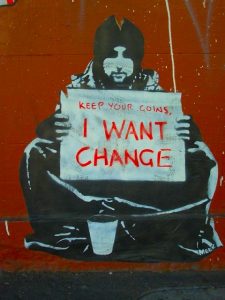Bearings
Give Us Shelter
Seeing, Hearing, and Dreaming with Homeless People in America
By Elizabeth Drescher
October 2019 Issue

Oh, a storm is threat'ning
My very life today
If I don't get some shelter
Oh yeah, I'm gonna fade away
~Keith Richards
The Stones were having a rough time when Keith penned their 1969 anthem, "Gimme Shelter." Some of that was professional. A 1967 album had tanked. The next one did better, but had only one hit. For Keith, the threatening storm was also personal, as his relationship with bandmate Brian Jones' ex, Anita Pallenberg, was straining against the pull of Mick Jagger's magnetic allure. All of which is to say that he wasn't really about creating an apocalyptic anthem for the Vietnam War era, a song that continues to speak to experiences of "the world closing in on you," as Mick would later put it. But there you have it: the personal turns out to be the political, the cultural, the spiritual.
This is the path followed by a remarkable group of contributors to this issue of Bearings, as they explore a range of engagements with people experiencing homelessness—engagements aimed at ensuring that the approximately 552,830 people in the United States who have no stable housing (17 out of every 10,000 people in the country, according to the National Alliance to End Homelessness) don't just fade away. Our contributors invite Bearings readers to see people experiencing homelessness, to listen to their dreams, to share companionship, meals, and celebration with them. They insist that we stand with people without permanent shelter through storms that are not of their making.
That begins, as Paul Houston Blankenship describes it in "Finding Friends of God on the Streets of Seattle," in befriending God by attending to the whole lives and the rich dreams, not the nightmares, of people living on the streets. That theme of friendship—holy friendship, we might even say—is further developed in community, as illustrated by Courtney Tabor, who shares the experience of joining a local congregation in creating shelter, offering companionship, and enjoying in a remarkable wedding anniversary celebration with asylum seekers from far away from Portland, Maine. Her "Sharing is a Gift in Itself" provides concrete and spiritual insight into how congregations can participate in structural efforts to address homelessness.
But, of course, addressing systemic causes of homelessness requires a willingness to really see the people who are experiencing it. Homelessness takes many forms, as our contributors make clear. Some people live on city streets. Some find temporary shelter with faith-based and community organizations. Some couch surf with family, friends, acquaintances for as long as they are able. Others, photographer Emilio Bañuelos and theologian Boo Riley show us, construct their own communities, their own shelter. Boo, who guest edited this issue, collaborating with all of our contributors to ensure we had an issue that reflected the complexity of the lives of people experiencing homelessness, was accompanied by Emilio on visits to Silicon Valley homeless encampments. There, Emilio made an array of photos shared in "Resilience & Mercy at the Margins" that show a vibrant community and the local ministers who are happy to spend their time, as Boo puts it, "Hanging Out with Homeless People in the Silicon Valley."
 Boo's rich commentary draws on years of accompanying undergraduates to local homeless encampments, where the experience of "hanging out"—sharing conversation, companionship, and sometimes prayer, along with food, water, and clothing—presses on the "default settings" that too often tell us that "homelessness is, well, an acquired state. Whether chosen or imposed, our default thinking goes, it is a temporary condition in need of a remedy." Offering "service" as a periodic, short-term remedy, Boo insists, misses the transformational point that Paul, Courtney, and Emilio make as well. Really seeing people experiencing homelessness, really listening to their stories and their dreams as though they mattered to our own lives, really forming bonds of mutual respect and friendship is meant to change us all, to transform a nation in which it's possible, for any reason, for half a million people not to know for sure they'll have somewhere safe to sleep tonight.
Boo's rich commentary draws on years of accompanying undergraduates to local homeless encampments, where the experience of "hanging out"—sharing conversation, companionship, and sometimes prayer, along with food, water, and clothing—presses on the "default settings" that too often tell us that "homelessness is, well, an acquired state. Whether chosen or imposed, our default thinking goes, it is a temporary condition in need of a remedy." Offering "service" as a periodic, short-term remedy, Boo insists, misses the transformational point that Paul, Courtney, and Emilio make as well. Really seeing people experiencing homelessness, really listening to their stories and their dreams as though they mattered to our own lives, really forming bonds of mutual respect and friendship is meant to change us all, to transform a nation in which it's possible, for any reason, for half a million people not to know for sure they'll have somewhere safe to sleep tonight.
One expression of how this personal, structural transformation plays out in everyday experience was shared by Heidi Shott in a 2017 issue of Bearings. Heidi's "Called to Dinner, Together" shares the story of the "elasticity" her family learned it had when they invited a 15-year-old young woman who'd been in a homeless shelter in Portland home for dinner. Such elasticity, Heidi tells us, "involves a willingness to make yourself vulnerable, to draw people into your circle as family members, and to be set free to do what family members do for one another."
"To do what family members do for one another." What members, our contributors suggest in this issue, of God's family do.
Photo Credits:
Featured Image: MichaelGaida, "Rain Puddle Water" (ND). Via Pixabay. CC 2.0 license.
Image #1: Mabi2000, "[Banksy] I Want Change" (December 24, 2004). Via Flickr. CC 2.0 license.

